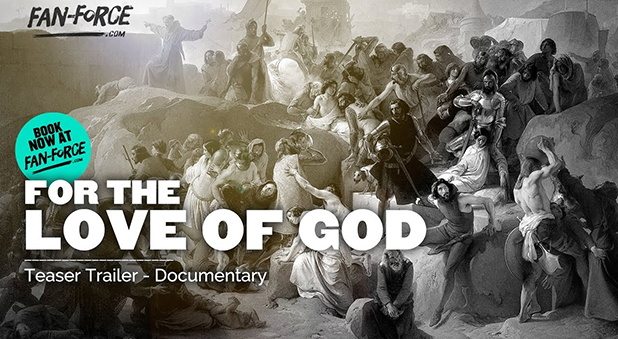Amid the howls of anger these days at Christians in general, and Bible-believing Christians in particular, the Centre for Public Christianity here in Sydney has done something very wise. It’s decided to tackle the criticism head-on, acknowledging the big, ugly warts in the history of our faith along the way.
This is why the subtitle of the documentary For The Love of God just released by CPX is: How the church is better + worse than you ever imagined. Because, of course, that is absolutely true.
As Christians we glory in the tales of selfless love, humility and God-honouring service that can be found throughout the past 2000 years. But we often get accused of hypocrisy. What about the Crusades? What about colonialism? What about the support, or silence, of the established churches in Germany during the time of the Third Reich?
They’re good questions. And as much as we might like to distance ourselves from the actions of others, we can’t hide from the appalling things done in the name of God. And nor should we. But what we should do, and what this documentary seeks to do, is provide a complete picture.
Presenters the Rev Dr John Dickson, Simon Smart and Dr Justine Toh take a three-pronged approach: we are shown the godly, life-changing efforts of Christians, the shameful failures of Christians, and also reminded about what the Bible says Christians should do, and how they should live.
The action takes us through time and across continents, using historical records, interviews and pieces to camera to show us the lives and actions of those who spent themselves in Christ’s name and how this changed those around them and society at large – even those who loathed Christians. Plus, how the sanctity of life and virtues such as caring for the poor and showing humility became more widely accepted because of the actions of Christian people.
We are also unflinchingly shown what sparked the Crusades in 1095, issues surrounding “The Troubles” in Northern Ireland, Nazism, and the shameful treatment of our Aboriginal people through murder, disease, carelessness or neglect.
Then, there’s the Bible. The documentary begins with words of Jesus from the gospels to love our enemies and do good to those those that hate us. And that’s a theme throughout this film. Who were those loving their enemies? Who were those spending themselves in Jesus’ name to care for the sick, the poor and those being led astray? Who were those standing up against racism and injustice, knowing it put their lives at risk?
One of the most profound stories of love and service – which may be unknown to many – is that of Father Damien, a Belgian priest who served a leper colony on the Hawaiian island of Molokai until leprosy also claimed him. Yet even when he knew his diagnosis he spoke of being “calm… and happy among my people”, adding that “Almighty God knows best”.
What is perhaps even more challenging for us is being told that Mahatma Gandhi was a great admirer of Father Damien and, while he liked Jesus, wanted more of Jesus’ followers to exhibit similarly Christ-like behaviour.
You may argue about some of what the presenters say, but they have sought clear historical underpinnings for any observations they make, and brought in scholars from around the globe to add further weight.
When it comes down to it, For The Love of God is helpful on three important fronts. First, it provides considered, researched answers to a number of questions posed by unbelievers about un-Christian behaviour over the past two millennia. Second, it balances these against examples of how Christians should and have behaved, noting the “powerful force [of their lives] for the common good”.
Third, for those of us who do believe it issues a challenge to live our lives, as Philippians 1 says, in a manner “worthy of the gospel of Christ” (v27).
For The Love Of God is screening on demand in cinemas from this month. For information about existing screenings, booking tickets or arranging a new screening, see betterandworse.film/


























